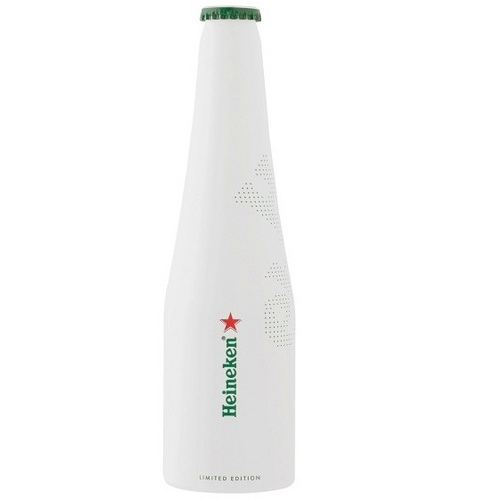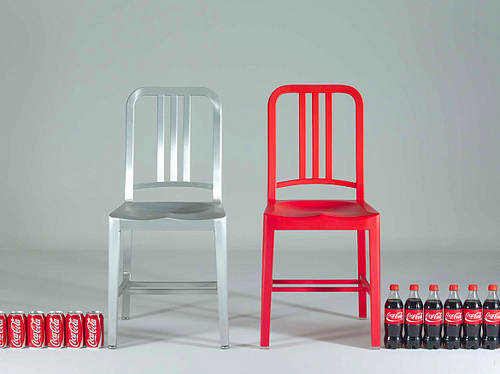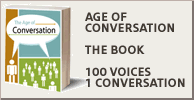
The downside of mass is that you lose your cool pretty fast. While domestics have experimented with more upscale/premium lines and a little bit of packaging innovation, they haven't really exploited the opportunities that exist with packaging. With the US design and art community often seen as being at the forefront of trends, it seems an obvious opportunity for the big domestics to work with these guys.
Heineken in Europe has done a lot of the work in this space, with the latest being a collaboration with Parisian packaging design legend Ora-Ito.

Of course, the other mass brand to do lots of cool stuff with graphic designers, was Coke.
Packaging seems like such an easy way for a mass brand to do something interesting and surgical to push into cooler spaces.
Posted by Ed Cotton
It must be like winning the lottery and something of a relief that you've found a way to scale your business by riding on the back of one of the world's largest corporations, but despite all the good news, it's when the problems really start.
The New York Times has an interesting article about the challenges ahead of Honest Tea.
"In late 2008, Mr. Goldman traveled to Coke headquarters in Atlanta to seek a solution. “I met with various people in the company who explained their belief that high-fructose corn syrup is comparable to sugar in its health impact.”
Mr. Goldman decided against trying to resolve the scientific point. “Our point of view was that we were not going to get into the debate over whether high-fructose corn syrup is the same as sugar,” he said. One option Coke presented, he said, was simply to eliminate the “no high-fructose corn syrup” banner. But Mr. Goldman argued that including the notification was a key signal to buyers that there were no hidden ingredients in the drink, an important issue given the growing chorus questioning whether high-fructose corn syrup contributed to the risk of obesity in adults and children."
There are hundreds of ice tea companies out there, some of which Coke could have brought 100% share of for less than the $40 million it took to buy the minority stake of Honest. The bean counters at Coke obviously did a lot of homework as they poured through Honest's books and were probably impressed by the rate of revenue growth and profitability. When they ran their forecasts, they obviously thought there was considerable growth potential with the brand and then probably contemplated some ideas of how the costs in the business could be reduced leading to greater profitability, using corn syrup was an obvious cost cutting tactic.
This is the problem with classic financial analysis for businesses, despite tons of discussion over the last 20 years, there's still no real place or discipline to measure the intangible brand value. Ad agency holding companies, who've had access to ample resources and had the discipline in this space seem to have failed to get this critical idea across to client CEO's and their boards.
If there was a clear understanding of how to value the intangible elements of the Honest Tea brand, no one would even mentioned the words corn syrup.
Posted by Ed Cotton

On the surface it seems like great PR directed at those worried about those islands of plastic in the Atlantic and Pacific because Coke can point to these products as living proof of its pursuit of the recycling cause. The reality is that the products reuse fraction of the PET that Coke produces in its many product lines worldwide.
What's really needed is something that's beyond a token effort- soft drink and bottled water players need to come together and sort this problem out because it isn't going away anytime soon.
It's likely to get worse and a few chairs aren't going to really change the minds of those who've been alarmed by Chris Jordan's photographs of birds in the Pacific.
Plastic bottles are a big problem and if the players are now finding themselves competing with tap water. So other than using PR spin to slam the quality of local tap water, a dangerous ploy since most of them use tap water for their water, they need to deal with plastic.
How about banding together and creating a market for used PET and using their marketing skills to persuade brands to use it and consumers to buy it? One small part of this effort could be a line of products, like Coke has done, but containing used PET from all the players in the business.
This would be a big shift away from creating a PR spin to benefit a single corporate entity that has very little overall impact to something much bigger in scale that could be a game changer.
Posted by Ed Cotton
Posted by Ed Cotton
Innocent has become something of an icon in the world of marketing for its frank and human approach. It has a unique perspective on its customers and is committed to doing good.
When Innocent sold its products in McDonald's, it came under fire from its customers, so clearly Coke's purchase presents something of a potential nightmare.
However, they handle it in true Innocent style, explaining clearly the reasons for the deal and inviting customers to share their opinions.
Open and clearly dialog is critical in this environment, especially when people have brought into your brand for years because you're an underdog.
"Hello.
Over the next few days you may read in the press about Coca-Cola making a minority investment in innocent, and we wanted to tell our drinkers and veg-potters about the deal and why it’s a great opportunity for innocent.
Basically, we’re dead excited about the investment. The funds raised allow us to do more of what innocent is here to do - get natural, healthy stuff out to as many people as possible. And the money raised is going into the business to fund our European expansion, so we can get innocent out to more places (none of the cash is being paid out to the shareholders; that desert island will just have to wait).
The three of us who set up the business will continue to run and manage innocent. We will be the same people making the same products in the same way. Everything that innocent stands for, remains in place - to only produce natural, healthy stuff; to push hard for better quality, more socially and environmentally conscious ingredients; to find more efficient and environmentally friendly ways of producing and packaging our drinks; to support charities in the countries where our fruit comes from; to have a point of view on the world, and to not take ourselves too seriously in the process. In fact, this deal will simply allow us to do more of these things.
As we said, Coca-Cola is a minority investor. They have a small stake of between 10-20%, which they paid 30 million pounds for. We chose Coca-Cola as our minority investor because as well as providing the funds, they can help us get our products out to more people in more places. Plus, they have been in business for over 120 years, so there will be things we can learn from them. And in some small ways we may be able to influence their thinking too.
innocent is ten years old this year. We sold 24 smoothies on our first day, back on 28th April 1999. This week, we will sell approximately 2 million. It’s taken a lot of hard work and not a small degree of luck to get us this far, but fundamentally the thing that has made it all possible has been the support of our retailers, suppliers, the media, and most importantly, you - our consumers. So, as the next chapter for innocent unfolds, and as we step up our mission of getting natural, tasty healthy things to eat and drink to more people, we want to say a sincere thank you to everyone who has ever bought an innocent smoothie. Without you, we’d just have an expensive fruit crushing hobby.
Thanks and bye for now.
Adam, Jon and Richard
Co-founders
innocent
PS As always, we’d love to hear what you think, so email richardr@innocentdrinks.co.uk with any thoughts or questions.
This will certainly become a recessionary trend as brand owners get concerned about making sure their product packs grab people by the throat and clearly inform them exactly what the products do for them.
The minimalist pack designs such as Turner Duckworth's recent work for Coca-Cola, will be replaced by multiple copy and perhaps even flashing neon signs.
Here's what's happening to Bud Light.
According to CNN...
"The plastic label on Bud Light's new bottles is 27 percent larger than the current label and touts "drinkability." The cans, which are nearly all blue, feature the word "refreshment." Bud Light's bottle labels went from paper to plastic in 2004.
Levy said the shift to blue came after extensive research showed the color helped drive home the message of refreshment."
Posted by Ed Cotton
